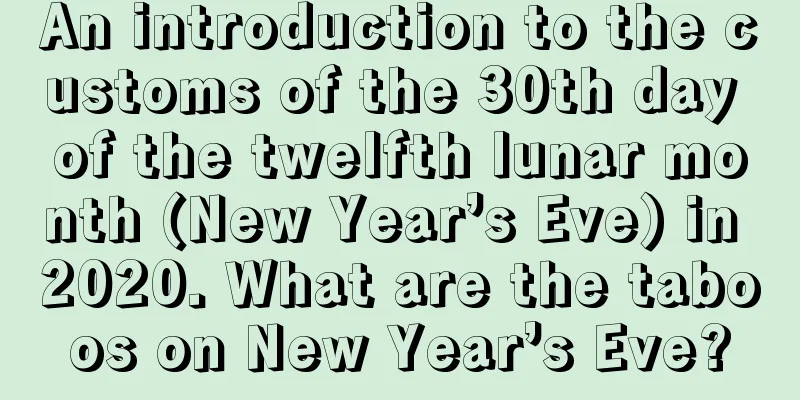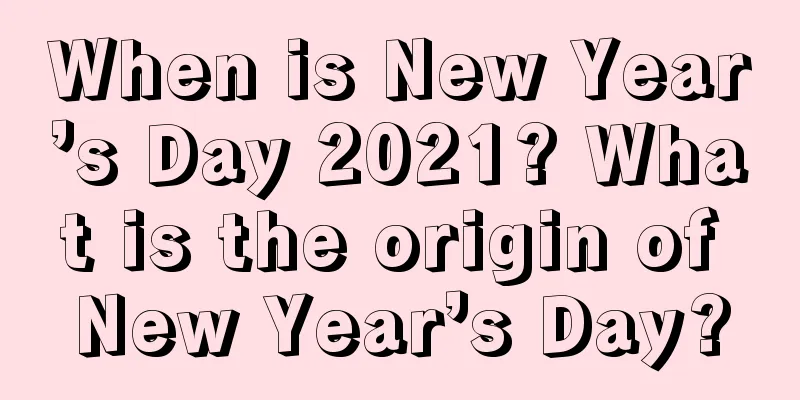An introduction to the customs of the 30th day of the twelfth lunar month (New Year’s Eve) in 2020. What are the taboos on New Year’s Eve?

In China, every festival and solar term has its own traditional customs. Let’s take a look at the detailed introduction of the customs of the 30th day of the twelfth lunar month (New Year’s Eve) in 2020. The arrival of the twelfth month of the lunar calendar heralds the coming of the new year. Follow Mr. Shui Mo to learn about every day of the twelfth month of the lunar calendar in 2020.A detailed introduction to the customs of the 30th day of the twelfth lunar month (New Year's Eve) in 2020Custom 1: New Year’s Eve DinnerNew Year's Eve is a very important day for Chinese people. On this day, people prepare to bid farewell to the old and welcome the new, and have a reunion dinner. Family is the cornerstone of Chinese society. The annual reunion dinner fully demonstrates the mutual respect and love among Chinese family members. This mutual respect and love makes the relationship between family members closer. Custom 2: Pasting New Year's gifts Nianhong is a general term for the red festive elements posted during the Chinese New Year, such as Spring Festival couplets, door gods, window flowers, New Year pictures, and blessing characters. Pasting New Year's greeting cards (Faitianchun) during the Spring Festival is a time-honored custom among the Chinese people. It reflects people's yearning for a happy life and their wishes for a better future. Custom 3: Lighting firecrackers There is a saying among the Chinese people that "firecrackers are set off when the door is opened". When the new year comes, the first thing every household does when they open the door is to set off firecrackers, using the sound of firecrackers to get rid of the old and welcome the new. Custom 4: Ancestor worship In ancient times, this custom was very popular. "Heaven and earth are the basis of life; ancestors are the basis of mankind." This means that heaven and earth are the basis of life, ancestors are the basis of our humanity, and ancestor worship is a custom that passes on filial piety. Custom 5: Staying up all night Staying up all night on New Year's Eve is one of the traditional activities during the Chinese New Year, and the custom has a long history. The custom of staying up late on New Year's Eve is mainly manifested in that all houses light the New Year's fire, the whole family gathers together, and guards the "New Year's fire" from being extinguished, waiting for the moment to bid farewell to the old and welcome the new, and to welcome the arrival of the New Year. Custom 6: Hanging Lanterns Hanging lanterns during the Chinese New Year is an ancient Chinese custom. The red color represents joy, the round lanterns represent reunion and happiness, and the red lanterns symbolize peace, harmony and prosperity. Custom 7: Lucky money New Year's money is one of the customs of the Chinese New Year. After the New Year's Eve dinner, the elders will distribute the New Year's money prepared in advance to the younger generations. It is said that New Year's money can suppress evil spirits, and the younger generations can spend a year in peace after receiving the New Year's money. Detailed introduction to the taboos on New Year's Eve1. You must not go to bed early on New Year’s Eve, because there is a custom of staying up all night on this day. 2. You cannot turn off the lights when you go to bed on New Year’s Eve. You can only turn off the lights when it’s light on the first day of the new year. The lights on New Year’s Eve stay on all night long and are commonly known as “light years”.3. On New Year’s Eve, the whole family eats the “family reunion dinner” together, which feels like a family reunion during the Chinese New Year. When eating the reunion dinner, the "fish" on the table cannot be moved, because the fish represents "wealth" and "abundance every year", and symbolizes "wealth and luck" in the coming year. It is a decoration and cannot be touched. 4. When having a formal meal, it is very taboo to be disturbed by others, especially not by visiting, because it is called "stepping on the New Year's dinner", which will make the whole family restless. 5. In many places, New Year’s Eve is also called “Auspicious Night”. On this night, adults and children alike must say auspicious words and are not allowed to say unlucky words, dirty words or disrespectful words, otherwise they will have bad luck for the whole year. 6. There is also a custom of not breaking objects on New Year’s Eve. People believe that if you break bowls, plates, cups or dishes on this day, it means bad luck in the new year. |
<<: What are the taboos on the beginning of spring? Introduction to Feng Shui Customs of Lichun
Recommend
Is the 14th day of the 11th lunar month in 2021 a good day? Can we sign the contract?
Different days have different qualities of good an...
Is the Dragon Boat Festival a legal holiday? What is the origin of the Dragon Boat Festival?
Introduction: The Dragon Boat Festival is an impor...
Is September 29th of the lunar calendar in 2018 an auspicious day for a haircut? How auspicious or inauspicious is the day and time?
In life, people will more or less encounter situat...
What are the auspicious days and festivals in April of the lunar calendar in 2019, the Year of the Pig?
Introduction: In our country's traditional cul...
What is the lunar calendar date of August 20, 2018? Is it a good time to start renovation?
Introduction: China has been a traditional country...
When is Valentine's Day? Romantic Tips for Valentine's Day 2020
It is said that as long as you love the right pers...
Is it suitable to set up the bed on the Summer Solstice on June 21, 2019? What is the hexagram of the Summer Solstice this year?
Introduction: The summer solstice every year will ...
Can’t move house in the beginning of autumn 2019? What are the auspicious days for moving around the beginning of autumn?
You need to choose an auspicious day to move, and ...
Will a boy born on April 13th, the day before Grain in Ear in 2020, have good luck with noble people?
Introduction: Children born on different days have...
Is the 29th day of the third lunar month in 2018 an auspicious day? Is it a good day to start construction?
As people's economic capabilities improve, mor...
Is it a good idea to pick up a new car on September 17th of the lunar calendar in 2018?
There are good and bad days, and this happens rep...
When is the Cold Dew solar term in 2019? Will it rain during the Cold Dew solar term?
Cold Dew means that it is late autumn, the dew is ...
Where is the God of Wealth on May 19th of the lunar calendar in 2020?
Where is the God of Wealth on May 19th of the lun...
Is November 13th of the lunar calendar in 2019 an auspicious day and suitable for worshiping ancestors?
The weather in the eleventh month of the lunar cal...
What is the date of the eighth day of the second lunar month in 2020? Is it a good time to start renovation?
The quality of every day is different, so it is ve...









